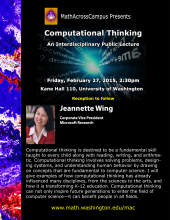Computational thinking is destined to be a fundamental skill taught to every child along with reading, writing, and arithmetic. Computational thinking involves solving problems, designing systems, and understanding human behavior by drawing on concepts that are fundamental to computer science. I will give examples of how computational thinking has already influenced many disciplines, from the sciences to the arts, and how it is transforming K-12 education. Computational thinking can not only inspire future generations to enter the field of computer science—it can benefit people in all fields.
Jeannette M. Wing is Corporate Vice President at Microsoft Research.
She is on leave from Carnegie Mellon University, where she is Professor of Computer Science and twice served as the Head of the Computer Science Department. From 2007-2010 she was the Assistant Director of the Computer and Information Science and Engineering Directorate at the National Science Foundation. She received her S.B. and S.M. degrees in Computer Science and Engineering in 1979 and her Ph.D. degree in Computer Science in 1983, all from the Massachusetts Institute of Technology.
Dr. Wing's general research interests are in the areas of trustworthy computing, specification and verification, concurrent and distributed systems, programming languages, and software engineering. She is a Fellow of the American Academy of Arts and Sciences, American Association for the Advancement of Science, the Association for Computing Machinery (ACM), and the Institute of Electrical and Electronic Engineers (IEEE).
